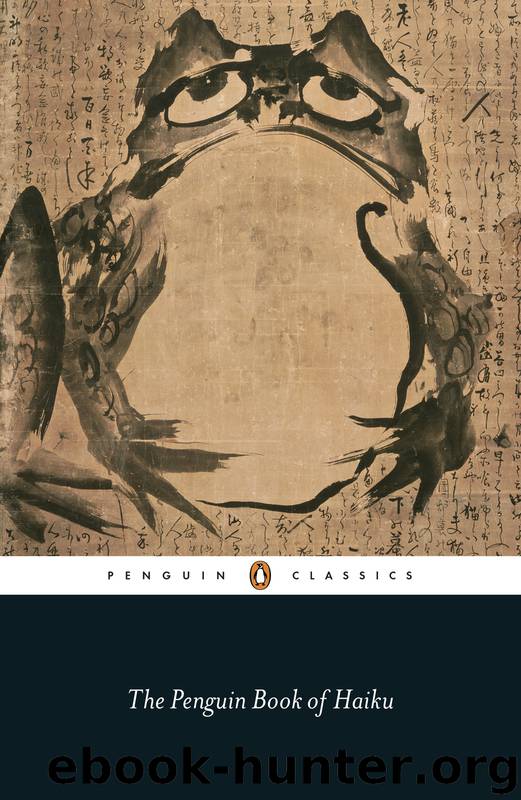The Penguin Book of Haiku by Adam L Kern

Author:Adam L Kern
Language: eng
Format: epub
ISBN: 9780141395258
Publisher: Penguin Books Ltd
Published: 2018-05-02T00:00:00+00:00
‘thanks for carrying on / while I was away from my wife!’ / said unknowingly
to wa shirazu / sate rusuchū wa / osewasama
Author unnamed. This verse appears in a comic skit from the time (c.1774). The phrase to wa shirazu, literally ‘not knowing about it’, was a euphemism for a secret affair. Shirazu, ‘not knowing’, implies that someone other than the husband ‘knows’ in both senses of the word.
‘thanks for keeping / my wife unmolested!’ / said unknowingly
to wa shirazu / kanai anzen / nado to share
Yamaki. In Yanagidaru 47 (1809).
challenge:
proposed half-jokingly / for having a little fun
muri iikakete / nagusami ni sen
response:
fastest of friends – / so let me take advantage of / your nubile wife!
sochi to ware / nengoro gai ni / nyōbo kase
Chikusui. In Fukaku (ed.), Niiki (1693). The absurd logic here depends on the almost seamless slippage from one set of punning meanings to another: sochi, from ‘you’ to ‘yours’; and nengoro, from ‘many years’, through ‘hospitable’ and ‘intimate’, to ‘marriageable age’.
her so-called ‘cousin’ / always seems to be visiting / when hubby’s away
itoko nimo / shiro yō kuru to / tabi no rusu
Author unnamed. In Yanagidaru 12 (1777). Although shiro here with nimo means ‘even if’, shiro also carries the associations of ‘innocent person’ and, even more tellingly, ‘substitute’.
challenge:
from gaps in the duckboards / a draught wafting upwards …
sunoko no ai o / fukiaguru kaze
response:
for goosebumps, / a twin pillow for lovebirds?! / her sultry coo!
torihada wa / hiyoku no makura / kotoba nari
Hakukei. In Fukaku (ed.), Chiyomigusa (1692). The response is a tour de force of wordplay. Both torihada (goosebumps) and hiyoku no makura (an extra-long ‘pillow for lovebirds’) are associated with kaze (‘breeze’ – or, in the case of an upwards one, ‘draught’) and sunoko (the wood-slatted ‘duckboard’ base in a closet for storing a futon and its bedding). Although the ai of the challenge means ‘gap’, the response plays not only on this word’s alternative meanings of ‘love’ and ‘rendezvous’, but also on its orthographic rendering as ahi (though still pronounced ai), the hi of which can mean ‘fire’, by virtue of a homonym of hiyoku (lovebird) as hi (sun) and yoku (thoroughly). Moreover, makura (pillow) pivots between the phrases hiyoku no makura (pillow for lovebirds) and makura kotoba (a set epithet in poetry, though literally ‘pillow words’).
challenge:
how admirable! / how admirable!
yukashikarikeri / yukashikarikeri
response:
bachelors / withdraw to their rooms / and groan
hitorimono / uchi e kaeru to / unari dashi
Author unnamed. In Yanagidaru 1 (1765).
belly-cutting scene / suspended to watch a brawl / in the audience!
hara o kiri / kakete kenka o / kenbutsu shi
Kyūsei. In Yanagidaru 52 (1811). One or more kabuki actors on stage momentarily stop a samurai disembowelment scene to watch a real-life drama among the theatregoers. Similarly that same year, the comic author Shikitei Sanba (1776–1822) published his popular Kyakusha hyōbanki (Critique of Theatregoers, 1811), which cleverly turned the tables on the genre of actor reviewbooks (yakusha hyōbanki) by treating the audience members as the real celebrities. (For
Download
This site does not store any files on its server. We only index and link to content provided by other sites. Please contact the content providers to delete copyright contents if any and email us, we'll remove relevant links or contents immediately.
| Death, Grief & Loss | Epic |
| Family | Inspirational & Religious |
| Japanese & Haiku | LGBT |
| Love Poems | Nature |
| Places |
The Universe of Us by Lang Leav(15067)
The Sun and Her Flowers by Rupi Kaur(14509)
Adultolescence by Gabbie Hanna(8917)
Whiskey Words & a Shovel II by r.h. Sin(8008)
Love Her Wild by Atticus(7749)
Smoke & Mirrors by Michael Faudet(6183)
Wiseguy by Nicholas Pileggi(5769)
The Princess Saves Herself in This One by Amanda Lovelace(4966)
Love & Misadventure by Lang Leav(4842)
Memories by Lang Leav(4795)
Milk and Honey by Rupi Kaur(4741)
Bluets by Maggie Nelson(4547)
Too Much and Not the Mood by Durga Chew-Bose(4337)
Pillow Thoughts by Courtney Peppernell(4271)
Good morning to Goodnight by Eleni Kaur(4231)
The Poetry of Pablo Neruda by Pablo Neruda(4097)
Algedonic by r.h. Sin(4056)
HER II by Pierre Alex Jeanty(3605)
Stuff I've Been Feeling Lately by Alicia Cook(3448)
